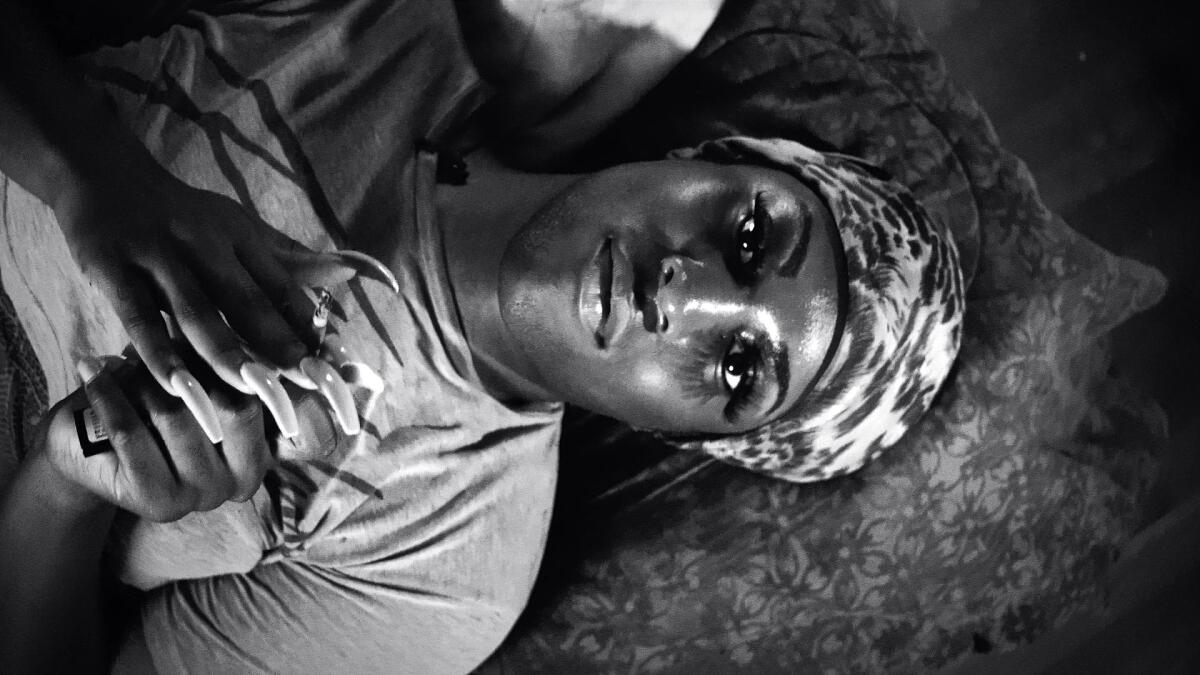In ‘Kokomo City,’ trans sex workers, rowdy and risky, get a compassionate profile

- Share via
The stark black-and-white imagery might imply otherwise, but “Kokomo City,” a documentary that profiles four Black transgender sex workers in New York and Atlanta, delivers a constantly surprising, undeniably entertaining portrait that proves anything but monochromatic.
At once bracingly candid and buoyantly energetic, the first feature by Grammy-winning trans singer-songwriter D. Smith clearly earns the trust of its personable quartet, who require little prodding to share their experiences and philosophies as they navigate decidedly nontraditional paths. Despite the marginalized lifestyles of its subjects — Daniella Carter, Dominique Silver, Koko Da Doll and Liyah Mitchell — “Kokomo City” has managed to strike a chord with festival audiences, earning key prizes at Sundance and Berlin.
As we hear, reasons for going into the sex trade vary. Silver learned that sex work would go a long way toward paying for her extensive cosmetic surgeries. For Koko Da Doll, it was the solution to getting herself, and her homeless mother and sister, off the streets of Atlanta.
As a reward for their unfettered honesty, Smith, who also serves as the film’s cinematographer and editor, presents them in the glam, high-gloss sheen of an Essence magazine cover via the silvery photography, reminiscent of Bruce Weber’s iconic fashion-ad campaigns.

A successful songwriter who has seen her output recorded by Lil Wayne, Kendrick Lamar and Fantasia, Smith also incorporates energetic music snippets and even interpretive dance sequences with playful panache. But the culturally-specific insights go deep, whether discussing clients and sugar daddies (“They’re not protecting us, they’re there to exploit and fantasize us”), or the barriers inherent in parental disappointment.
“My mother was so used to losing Black men in her life,” relates the particularly perceptive Carter. “And so she feels again being abandoned by another Black man when this Black son says, ‘I’m becoming a Black woman. I’m not here to protect you. I’m here in some ways to be as vulnerable as you.’”
Unfortunately, that vulnerability often comes at a cost, with the loss of colleagues from murder, drugs and HIV-related illness. Among the casualties are 35-year-old Koko Da Doll (born Rasheeda Williams), who had hoped to pivot from the sex trade to a full-time music career before she was fatally shot outside an Atlanta shopping center in April of this year.
For the rest of them and those who continue to live life “on the stroll,” the disarming “Kokomo City” provides a humanizing, inclusive way forward.
'Kokomo City'
Rating: R, for strong sexual content, graphic nudity, language throughout and drug use
Running time: 1 hour, 13 minutes
Playing: Now at Alamo Drafthouse Cinema, DTLA
More to Read
Only good movies
Get the Indie Focus newsletter, Mark Olsen's weekly guide to the world of cinema.
You may occasionally receive promotional content from the Los Angeles Times.










